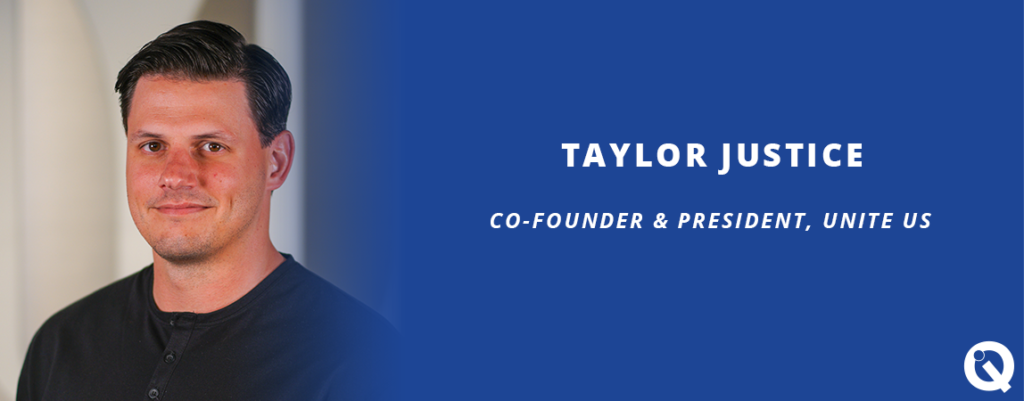Taylor Justice is Co-Founder and President of Unite Us, a technology company that connects health and social services. The organization recently acquired NowPow, a Chicago-based referral platform grounded in science and community. Unite Us is a member of the Quality Institute’s Professional & Technology Council.
Since the acquisition of Now Pow, Unite Us is working closely with several health systems and Regional Health Hubs in New Jersey. Can you tell us about those initiatives?
We’re working with some of the state’s leading health systems, including Hackensack Meridian Health and RWJBarnabas, as well as three of the four Regional Health Hubs — and hundreds of community-based organizations. We identified a long time ago that there were no paths that allowed health care organizations, government entities, and community-based organizations to work seamlessly with each other. So we built a technology solution that allowed them to securely exchange data around a shared client. We are extending care coordination out into the community to provide that social care coordination network if, say, I need to connect someone to a housing organization, a food organization, or maybe a transportation provider. We coordinate all those resources.
In addition, we’re working closely with Horizon Blue Cross Blue Shield of New Jersey to continue to support and strengthen the Neighbors in Health program.
How is your work helping to address racial inequities in maternal child health?
Through our work with the Virginia Department of Health, several Maternal and Child Health programs — including WIC, Nurse-Family Partnership and Healthy Families — are using our Unite Virginia network. We have also brought community-based doulas on board across the state and are steadily growing the breadth and depth of programs serving pregnant and parenting families across the state.
In California, we’re addressing Adverse Childhood Events (ACEs) initiatives in several counties, and we’re confident that these types of models can be replicated in other parts of the country. In short, we provide the longitudinal journey and access for all these historically siloed industries to coordinate care with each other, so that collectively we can improve overall health and wellbeing of individuals. I should add that people must give their consent if they want to participate; Unite Us is HITRUST, SOC 2, and NIST certified, and follows the highest security frameworks in the industry. People drive the ship of their own care and can revoke consent at any time.
How do you track outcomes?
Let’s imagine for a moment that you’re a community health worker (CHW). Someone walks in and needs assistance, with maybe housing or food. The old way is the CHW would give the person information and send them on their way, and there would be no way to know if the person ever got the help they needed. With Unite Us’ coordinated care network, each organization signs service level agreements to respond to referrals in a particular time, keep their information up to date, but, more important, to provide outcome data on services that have been rendered. So, no one slips through the cracks.
As another example, imagine you are a social worker who refers someone to a food pantry. You can see if a food pantry has taken control of the referral. You’ll then receive real-time updates that will go back to the electronic health record or the care management platform. Then we aggregate that data across the community to identify timeliness to care across all the different service categories, such as housing, employment, food, and transportation. This data then comes back so that community leaders can make better decisions on how they administer their initiatives, their programs, or their care for their constituents. This data can also help drive investments back into communities where they’re needed the most.
You are a co-founder of Unite Us and a veteran. How does your military background influence your work now?
My co-founder and I are both from the military. When we originally founded Unite Us, we were focused on the veteran and military population because there were clear gaps in services and little to no care coordination. But from 2018 until today, we’ve expanded to encompass all individuals and communities. Of course, our leadership is still influenced by our military experiences and those early days of Unite Us. We learned in the military that you must know how to shift strategy in real time. Our solution and technology are always evolving and improving.
We like to ask people something outside of their professional life. Where might we find you on a day off?
During the pandemic I became obsessed with golf. I never really played golf before – I played football in the Army. After being cooped up in a New York City apartment for so long, a buddy asked me to go play golf. And I got outside for four hours and just fell in love with it. And I’m awful. It’s so challenging. I lose more balls than I keep, but there’s something about getting outside, and the challenge of trying to figure out my swing and navigate the course that keeps me going back for more.

